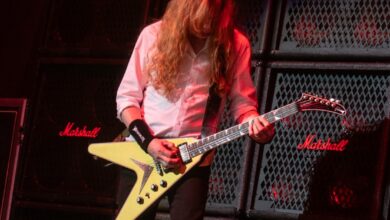Metallica Reclaimed Their Throne with a Ferocious “Master of Puppets” in Atlanta 2025
On June 3, 2025, Metallica delivered a blistering performance of “Master of Puppets” that rocked Atlanta’s Mercedes-Benz Stadium to its foundation. The song’s thunderous intro immediately triggered a wave of excitement throughout the crowd. Thousands roared in unison as James Hetfield struck the first chords, setting the tone for a performance that would be talked about for years. The air felt electric, heavy with anticipation and raw energy.
“Master of Puppets” is more than just a song—it’s Metallica’s anthem. Released in 1986 as the title track of their third studio album, the song represents the band’s evolution from underground thrashers to metal titans. That night in Atlanta, the band paid tribute to that legacy by performing the track with the same fury and precision they did nearly four decades ago. The performance transported fans back in time.
Kirk Hammett’s lead guitar work was sharp and aggressive, his fingers gliding over the fretboard with a confidence honed by decades on stage. His solo midway through the song drew a thunderous cheer, evoking memories of the late Cliff Burton, whose influence still echoes in every note of this classic. Kirk’s passion and showmanship were at an all-time high, matching the intensity of the crowd.
Lars Ulrich anchored the song with pounding double bass and relentless snare hits. Every beat landed like a hammer, propelling the band forward through the song’s shifting time signatures and dynamic transitions. Lars has always been the rhythmic backbone of Metallica, and on this night, he was in peak form, his playing tight and fierce. His commitment to every moment added gravity to the show.
Robert Trujillo’s bass playing carried a sense of reverence, especially during the instrumental breakdown. The section where the band slows things down before building up to the final assault was haunting. Trujillo stood still in the shadows for a few moments, letting the somber notes ring out like a prayer. It was a nod to Cliff Burton’s original spirit on the track—quietly powerful.
James Hetfield’s voice sounded raw yet controlled, his growl aging like whiskey—stronger, deeper, and more authentic. When he bellowed, “Master! Master!” the entire stadium shouted back with thunderous force. It was one of those communal moments where the line between band and audience vanished. Everyone became part of something larger than themselves—servants of the same master riff.
The stage production took the intensity up another level. Each downbeat was accompanied by strobing red lights and bursts of pyrotechnics. The band played surrounded by an industrial stage set that looked like a dystopian fortress—fitting for a song that explores themes of control and addiction. It wasn’t just a concert—it was a theatrical warzone of sound and fury.
This performance felt especially significant as it marked nearly 40 years since Metallica first introduced “Master of Puppets” to the world. The song has stood the test of time, not just musically, but culturally. It has been featured in movies, covered by orchestras, and even introduced to new generations through shows like Stranger Things. That Atlanta crowd understood its importance—and they treated it like a sacred rite.
Many attendees had seen Metallica multiple times, but few could remember a more intense performance of “Master of Puppets.” It wasn’t just about technical execution—it was about the emotional weight behind every lyric and riff. Hetfield’s personal struggles with addiction have always added extra resonance to the song’s message, and his delivery on this night carried both pain and triumph.
The crowd’s energy never wavered. Mosh pits formed, heads banged, fists pumped, and voices screamed throughout the entire 8-minute track. The stadium felt alive in a way few venues ever do. You could feel it in your chest—the reverberation of collective release, of decades of fandom erupting in real time. Everyone knew they were witnessing something rare.
Between verses, the cameras panned across the crowd to show fans of all ages—kids on their parents’ shoulders, aging rockers in faded tour shirts, couples in tears. It was a testament to Metallica’s cross-generational reach. This wasn’t just music—it was a connection passed down, preserved, and celebrated with unmatched passion.
As the final section built up to its crushing conclusion, the band locked in with laser-like focus. Every note was sharp, deliberate, and brutal. When the last chord rang out, there was a moment of breathless silence before the stadium exploded in applause. It wasn’t polite clapping—it was the kind of roar you give to a gladiator who just won the arena.
After the show, social media lit up with footage from the performance. Fans called it the highlight of the entire M72 World Tour. One clip of the crowd screaming the chorus went viral within hours. Even longtime critics of the band were stunned by how vital and relevant Metallica still sounded. The internet declared it one of the best renditions of the song in years.
The band exited the stage that night drenched in sweat but visibly energized. Hetfield offered a final salute to the crowd, shouting, “Metallica loves you, Atlanta!” before vanishing into the darkness. It was a fitting end to a set that felt like a full-circle celebration of everything the band has endured and conquered. They didn’t just play “Master of Puppets”—they embodied it.
For those in attendance, June 3, 2025, will forever be remembered as the night Metallica reminded the world why they’re still the masters of metal. From the first riff to the last roar, they proved that some songs don’t just endure—they evolve, grow, and continue to inspire. In Atlanta, “Master of Puppets” wasn’t just performed—it ruled.





